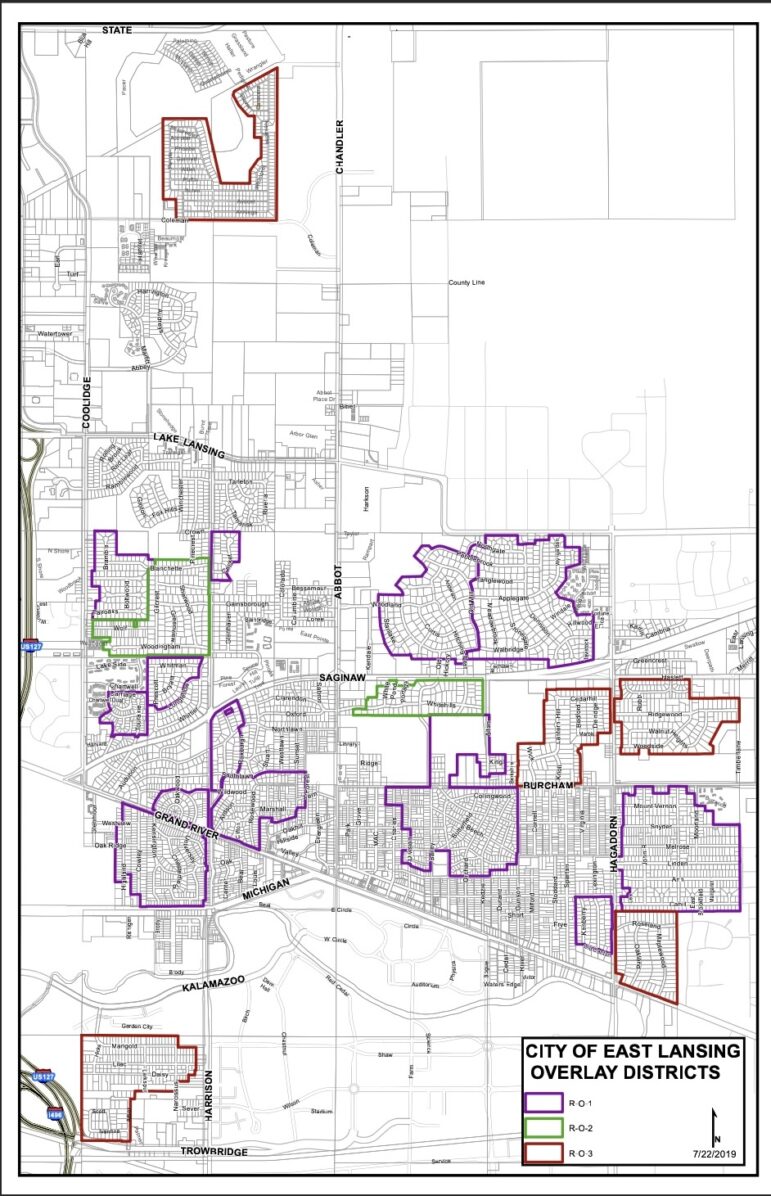In East Lansing, Rental Restriction Overlays allow for neighborhoods to restrict rental properties in their parts of the city, making it more difficult for low-income people to find housing and limits rights of homeowners.
According to the City of East Lansing, the Residential Rental Restriction Overlay District Ordinance was established in 2004 to “allow owners of property within residential neighborhoods the opportunity to preserve the attractiveness, desirability, and character” of their neighborhoods. It limits renters and their associated negative consequences like “property deterioration, increased density, congestion, noise and traffic levels and reduction of property values.”
So, residents in any East Lansing neighborhood can restrict rental licenses in their neighborhoods by getting two-thirds of all homeowners to sign a petition. The petition is then brought to the City Council.
Three types of Rental Restriction Overlays (RRO) can be petitioned. According to East Lansing, R-0-1 prevents any new rental licenses, R-0-2 allows only property owners to obtain Class I rentals and R-0-3 allows only new Class I rentals. A Class I rental allows for homeowners to have a non-family roomer live with them and their family. However, rental properties already established in the neighborhood can remain how they are.
The website listed 20 ordinances.

Mary Mahoney is a member of the East Lansing Housing Commission, and she said its primary responsibility is to review rental housing licenses and make recommendations to the City Council.
Mahoney said the surrounding neighborhood is told when a new rental license is given. Neighbors will often talk to the commission about their main concern: student rentals. She said neighbors–and the city–want to promote families in these neighborhoods rather than the stereotypically rowdy Michigan State University student population.
However, the commission has no control over landlords besides granting the license.
“If I was a landlord, I would look at how much I can get per person for rent out to two people versus a family,” Mahoney said, “so of course a landlords probably going to go to where they can earn more money.”
Students are a protected class, so rental licenses can’t exclude them. Therefore, many East Lansing residents have opted for an overlay district, preventing student renters.
Rebecca Kasen, the executive director of the Women’s Center of Greater Lansing, works with underprivileged people and is a member of the East Lansing Human Rights Commission. She said the overlays “are an abomination.”
Kasen said overlay districts perpetuate racism, as Black Americans are much more likely to be renters. According to the National Association of Realtors, Black American homeownership is around 44% while white American homeownership is almost 73%.
East Lansing was historically a sundown town, Kasen said, meaning non-white people were intentionally kept from living in the city.
“Instead of perpetuating that legacy,” Kasen said, “we need to find ways to be a more inclusive city.”
Kasen said overlay districts are also discriminatory towards students and aim to solve a problem that she isn’t sure exists in East Lansing. If students are being disruptive, she said her and her neighbors would call the cops.
“The overlays are disproportionately hurting lower income families who want to move into East Lansing and hurting students who can’t find housing,” Kasen said.
Likewise, constitutional attorney Jeffrey Hank, an East Lansing resident of 20 years, lives in a house in the Bailey overlay district adjacent to the Michigan State University campus but is “completely surrounded by rentals in every direction.” A frat house is two properties away.
“I have people breaking into my garage, people peeing in my yard, trashing my yard, pulling my bushes out, my trees out, throwing beer bottles at the house,” Hank said. “I mean, I’ve lived it for 20 years. I know what it’s like.”
However, he said these issues can be handled through enforcement rather than overlays, which he feels are unconstitutional and a disservice to homeowners.
Hank said the city code is “very discriminatory on who you may choose as your family and who you may have in your home.” He said homeowners in violation of the code have been fined in excess.
He is frustrated that he and other homeowners can not rent out their houses, Hank said, despite portions of their taxes being used to subsidize apartment developers.
Hank said the city violated homeowners’ “fundamental rights as an American of owning property and how you can use your property” as well as first amendment free association rights of “who you want to build relationships with.”
The city has been sued several times over overlay districts, Hank said, but no action has been taken by City Council to change the policy.